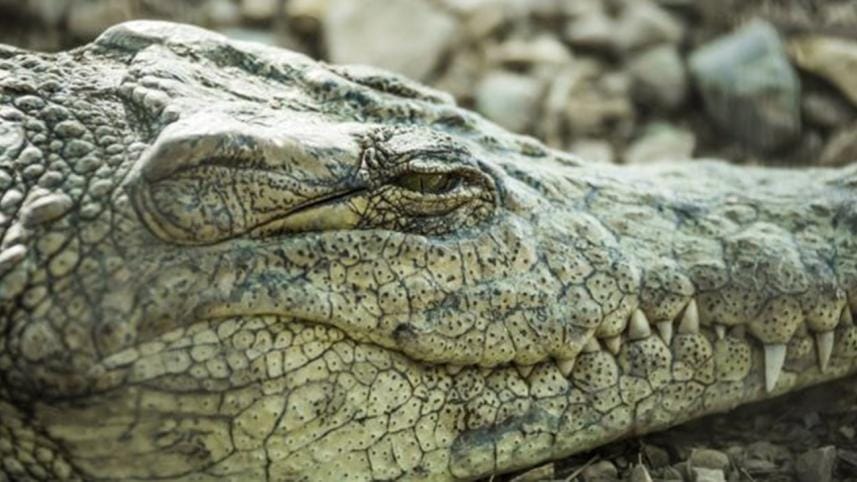Crocodiles sleep with one eye watching

Crocodiles can sleep with one eye open, according to a study from Australia.
In doing so they join a list of animals with this ability, which includes some birds, dolphins and other reptiles.
Writing in the Journal of Experimental Biology, the researchers say the crocs are probably sleeping with one brain hemisphere at a time, leaving one half of the brain active and on the lookout.
Consistent with this idea, the crocs in the study were more likely to leave one eye open in the presence of a human.
They also kept that single eye trained directly on the interloper, said senior author John Lesku.
"They definitely monitored the human when they were in the room. But even after the human left the room, the animal still kept its open eye… directed towards the location where the human had been - suggesting that they were keeping an eye out for potential threats."
The experiments were done in an aquarium lined with infrared cameras, to monitor juvenile crocodiles day and night.
"These animals are not particularly amenable to handling; they are a little snippy. So we had to limit all of our work to juvenile crocodiles, about 40-50cm long," said Dr Lesku, from La Trobe University in Melbourne.
As well as placing a human in the room for certain periods, the team tested the effect of having other young crocs around. Sure enough, these also tended to attract the gaze of any reptiles dozing with only one eye.
This matches what is known of "unihemispheric sleep" in aquatic mammals, such as walruses and dolphins, which seem to use one eye to make sure they stick together in a group.
By contrast, birds use this strategy to watch out for predators. "In threatening situations, birds will increase their use of unihemispheric sleep and maintain their open eye on any potential threat," Dr Lesku explained.
"It seems to be a bit of both, in the case of these juvenile saltwater crocodiles."
Everybody else is doing it
The next step will be to confirm that, as well as simply opening one eye, the crocs are indeed only - physiologically - half asleep.
"Ultimately we would require electrophysiological recordings - so you'd have to look at brain waves in both hemispheres of a sleeping crocodile, to say: is one hemisphere awake while the other is asleep."
Dr Lesku is already preparing those experiments, working with colleagues in Germany to stick electrodes - carefully - on the heads of Nile crocodiles.
Meanwhile, the discovery of one-eyed sleep in crocodiles firmly fixes this capacity to yet another branch of the evolutionary tree.
We and our fellow land mammals, it seems, are running out of company in our all-consuming slumber.
"To me, the most exciting thing about these results is they provide some evidence to think that the way we sleep might be novel, in an evolutionary sense," Dr Lesku said.
Half-brain sleeping, he explained, may have evolved in a shared ancestor of reptiles and birds, and separately in the aquatic mammals - or perhaps in an even more distant ancestor, shared by birds, reptiles and mammals, before ancient land mammals somehow lost the knack.
"We tend to think of our sleep as the norm: a behavioural shutdown that is a whole-brain affair. And yet if birds sleep unihemispherically, and if crocodiles and other reptiles that engage in unilateral eye closure - if it turns out that they are also also sleeping unihemispherically, then suddenly our sleep becomes unusual.
"Then, pretty much the only things that aren't sleeping this way are the terrestrial mammals."
 For all latest news, follow The Daily Star's Google News channel.
For all latest news, follow The Daily Star's Google News channel.
Comments